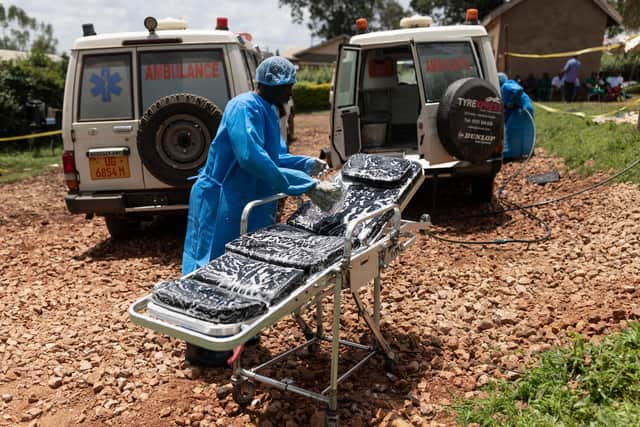Three-week lockdown announced for two districts in Uganda amid Ebola outbreak
The measures announced by President Yoweri Museveni mean bars, nightclubs, places of worship and entertainment venues will be closed in Mubende and neighbouring Kassanda, and a curfew will come into force.
Cargo vehicles and others transiting from Kampala, the capital, to south-western Uganda are still allowed to operate, he said.
Advertisement
Hide AdAdvertisement
Hide AdA night-time curfew also has been imposed. The restrictions will last at least 21 days.


Mr Museveni said: "These are temporary measures to control the spread of Ebola.
"We should all cooperate with authorities so we bring this outbreak to an end in the shortest possible time."
The president had already ordered police to arrest anyone suspected of having the virus who refused to isolate.
Ebola has infected 58 people in the East African country since September 20, when authorities declared an outbreak.
At least 19 people have died, including four health workers. Ugandan authorities were not quick in detecting the outbreak, which began infecting people in a farming community in August as the "strange illness" described by local authorities.
The new measures come amid concern that some patients in the Ebola hot spots could surreptitiously try to seek treatment elsewhere - as did one man who fled Mubende and died at a hospital in Kampala earlier this month, unsettling health officials.
Ugandan authorities have documented more than 1,100 contacts of known Ebola patients, according to the Africa Centres for Disease Control and Prevention.
Advertisement
Hide AdAdvertisement
Hide AdThe Sudan strain of Ebola, for which there is no proven vaccine, is circulating in the country of 45 million people.
Ebola, which manifests as a viral haemorrhagic fever, can be difficult to detect at first because fever is also a symptom of malaria.
Ebola is spread through contact with bodily fluids of an infected person or contaminated materials.
Symptoms include fever, vomiting, diarrhoea, muscle pain and at times internal and external bleeding.
Ebola first appeared in 1976 in two simultaneous outbreaks in South Sudan and Congo, where it occurred in a village near the Ebola River after which the disease is named.